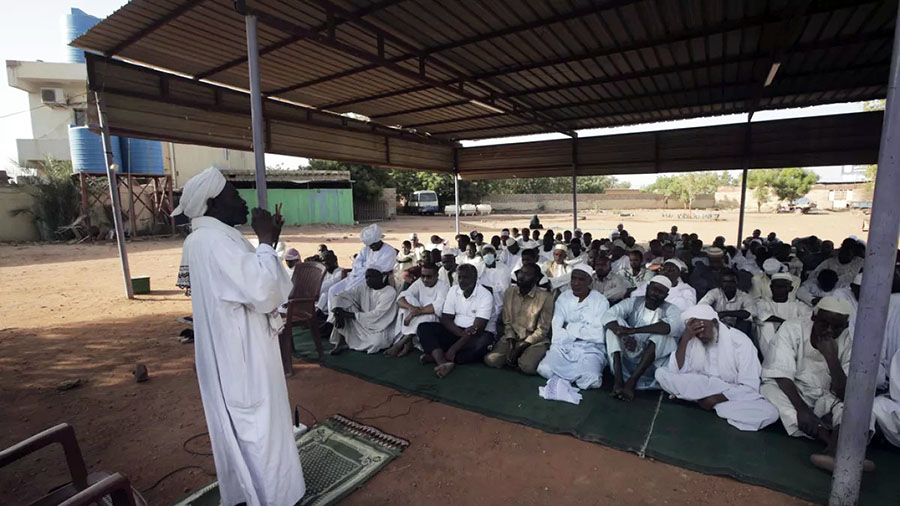
Sudan: Cautious Eid al-Fitr Celebrations as Two Cities Welcome It to the Sound of War
Moatinoon - Websites
Two cities across Sudans states welcomed Eid al-Fitr to the sound of cannons and the smell of war: El Fasher, the capital of North Darfur State, and Atbara, in the heart of River Nile State.
According to Moatinoon sources, the Eid ceremonies, which began Sunday morning in preparation for prayer after the end of Ramadan, coincided with the sound of anti-aircraft missiles that repelled an attack by approximately nine drones targeting the citys airport. The sources said that loud explosions were heard throughout the city, alarming residents. However, they confirmed that the missiles successfully shot down and neutralized the drones, preventing them from reaching their targets, without causing any material or human losses.
At the same time, Rapid Support Forces artillery targeted El Fasher, after several days of calm on the battlefronts, following the armys control of Khartoum. The Sudanese Armys Sixth Infantry Division stated in a statement that the Rapid Support Forces artillery resumed its shelling at 7:00 a.m. and continued until 10:00 a.m.
The bombing of El Fasher, according to an army statement, resulted in the deaths of nine civilians and the injury of 17 others.
This is the third Eid al-Fitr that Sudanese people have celebrated amidst the war that began on April 15, 2023, at the end of Ramadan. Sudanese in Khartoum and Omdurman welcomed the holiday with cautious hope amid the suffering they are experiencing.
According to a report by Al-Araby Al-Jadeed, shops and bakeries in Omdurman offered modest Eid gifts—biscuits, cakes, and childrens clothes—despite shortages and the threat of renewed violence.
"The situation is different from last year," Mohammed Mumin, a 25-year-old resident of Omdurman, told Al-Araby Al-Jadeed. "While the city is still suffering, there is a cautious sense of a return to life."
On Saturday, the Sudanese Armed Forces announced they had taken control of parts of the Libya Market, a major market in western Omdurman that had been a strategic location for the paramilitary Rapid Support Forces. The Rapid Support Forces had used the area as a base for their military operations.
Nevertheless, residents remain on edge. Momen noted that people fear the possibility of drone strikes by the Rapid Support Forces or renewed fighting in urban areas, especially during public gatherings such as Eid prayers.
In the early hours of Sunday morning, mosques in parts of Khartoum state were only partially full, as security concerns kept many worshippers at home.
In Port Sudan, the current seat of Sudans internationally recognized government, larger crowds gathered for Eid prayers in relative calm. This was the first Eid in which the idea of peace seemed, for some, less remote.
"People are also suffering financial hardship," Momen said. "After two years of war and displacement, we are economically and psychologically exhausted."
"Eid is a holiday for family and friends," Hind Ahmed, who fled Khartoum for Port Sudan, told the Tanzania News Agency (TNA). "But we have lost most of them—in the war and in exile."
On March 26, Lt. Gen. Burhan visited the presidential palace in Khartoum and declared the citys "liberation." Crowds gathered in some areas to celebrate, but much of the capital remains a battlefield. The Rapid Support Forces (RSF) still control parts of Bahri and West Omdurman, two key components of the "triangle capital" along with Khartoum.
According to a report by Al-Araby Al-Jadeed, videos circulating online show continued destruction, looting, and lawlessness in areas retaken by the army. The RSF has vowed to continue its campaign, and fighting continues in Darfur, Kordofan, and parts of Al-Jazirah state.
"The joy of victory will not be complete until the last rebel is eliminated," Al-Burhan said in his Eid address.
But for many Sudanese, the cost of this war is too high.
"Its hard to find a sense of celebration," said Sara Ahmed, a Sudanese refugee in Egypt. "I try to pretend to do it in front of my children, but weve endured too much loss, too much pain, and too much displacement."
For many, Eid in Sudan also serves as a reminder of a darker chapter. In June 2019, just days before Eid, security forces violently dispersed a sit-in outside the army headquarters in Khartoum, killing more than 100 peaceful protesters. The massacre became a symbol of the struggle for democratic transition and the militarys betrayal of that promise.
"This Eid is not about improving things," said Momen. "Its about Sudanese resilience. Its about the unshakable belief that better days are coming."

